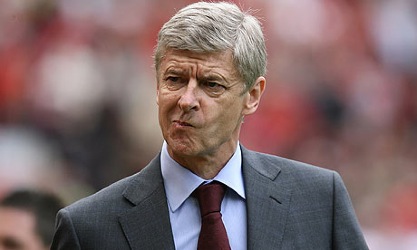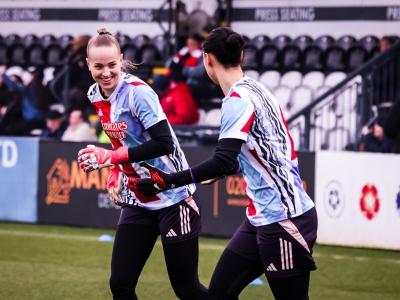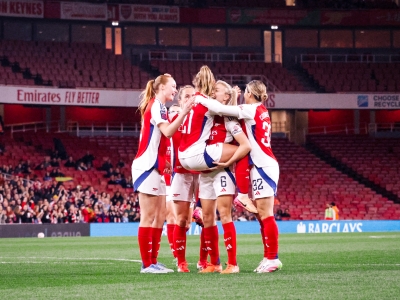(Ed’s note, I received an email from an occasional correspondent a while ago and have held this back for a less busy time in the Arsenal world. The sender has asked not to be credited, but here is what they had to say – the comments are theirs, not mine… )
I’m not sure whether this interview was already covered on the Arsenal blogosphere, but I found it interesting. It’s an interview by AW with L’Equipe Magazine (the thing that the Observer Sports Magazine ripped off/is based on) of 17 Oct 2009. Selected bits translated (by me, quite liberally – and some of it is quite tricky language so I can’t guarantee 100% the accuracy). But I think it gives a real insight into his thinking – he often speaks more openly to the French media than to the UK/other media (for example, to Canal+ after the Porto game he admitted: “well I am more indulgent with my own players than with the referees so…”).
“[We] have a lot of offensive talent but we still have a weakness in the air in defence, on set pieces. We don’t have tall guys.”
“Everything depends on the opposition. Against [a long ball team] you need tall players; against [more technical teams] you don’t”
[COMMENT: Incredible admission by the manager, eh? But now I will tell you that he was not talking about Arsenal but about the French national team… so if he can see it with them, why not with us???]
“I love it when a current passes through the eleven players on the pitch: when it comes to life, a quick interchange. That’s what makes me happy. This is only possible when the players are educated together. It seems as if I like “romantic” football, which is a way of seeking beauty. You need this ambition from the off. But I am not an advocate of beauty for beauty’s sake. Pleasure also comes from winning, I am in favour of a “bit of extra bonding”: a team built patiently, with young players destined to stay together for five or ten years, who identify with the football culture of their club, a bit like how one remembers one’s first school… This is not idealism. My philosophy has not stopped us winning Cups and reaching a final, a semi-final and a quarter final these last four years...”
[COMMENT: I do not know what he is referring to when he says “us winning Cups” – pre-season?]
“I am more a builder than an investor. In fact, I am a realist. When I had the new Arsenal stadium built, the Emirates, I said to myself: ‘How can we stay at the top level whilst playing with the best players, against the best clubs, whilst respecting the financial constraints of the club?’ The only solution for me was to build a team of young players and, bit by bit, bring them to the top level
In fact, the time when I was most criticized, last season, was when I did most for the club. It was difficult for me because we were left behind in the title race but in the end we reached an FA Cup semi-final and another in the Champions League. All the clubs who have built a new stadium in England have been relegated. As for us, we have a sound financial position, we made 50 million in profit last year. I told the shareholders that they should have faith in this team and that the club was healthy. It all comes back to my belief. When I arrived the shares were worth £400. They are worth £8,500 12 years later. So the club is in not such a bad state after all. Now, if in two years I have not had any success, then it will be my fault. It is a bet I am prepared to make. I am a professional person and a professional person should be more capable than others of predicting the future, even if it runs against public opinion.”
[COMMENT: is comment on teams getting relegated is, like a lot of his statistics these days (Henry did not join at 23, Arsenal had 58% not 70% of possession vs Chelsea, the average age of the team is 24-25 not 22-23 like he frequently says, and so on), woefully out of touch with reality – Wigan? Bolton? Stoke? Sunderland? etc]
“Real Madrid is the club of my childhood. When I was a kid, seeing those guys in all white winning everything... Certainly it’s a club that attracts me, but I have a pact with the young players of my team and I want to win this bet. I have identified what is important to me in my profession: my freedom. And here, I have it. I would have had a much higher salary at Real Madrid. But I already earn a great living in London. Money should not play an important role at my age. If I’d gone to Real Madrid [Note of L’Equipe Editor: ‘he received an offer in Spring’], I would have tried to let my philosophy come through, to radically change things, to reorganize as much as I could have, to give some foundations at a structural level of the club. That would not have stopped me from signing Ronaldo or Kaka, but it’s a team which is only based on signed players, whilst Real has a tradition of great football. You need to do what Barcelona have done through their young players: create a culture. Barca have been able to do it better than Real, notably by putting a lot more emphasis on youth development. A coach who respects himself works on both the present and the future. On what he will leave behind when he goes.”
[COMMENT: again, here the facts risk getting in the way of a good story – Real have produced some great players like Casillas, Raul, etc. and have produced the highest number of players of any club playing in the top five European leagues. And Barca have signed a lot of their first team – Messi albeit very young, Ibrahimovic, Henry, Dani Alves, Yaya Touré, Abidal, Eto’o before, etc]
“The best signing of a manager is not necessarily linked to the quality of the player. I could cite Nasri or Diaby…but those who allowed me to have a basis in this club at a time when foreign managers were not accepted in England are those who I signed first of all, the Vieiras, Henrys, Petits… Those who allowed me to gain credibility. I will always be grateful to them.”
“I have a philosophy very close to that of Johann Cruyff. He showed what it was to be a true manager. He left but his football culture lives on. It’s not that I dream of being immortal but, at this level, the manager becomes a kind of guide for the future. He bequeaths a benchmark at the moment where a club is looking for its own identity. When a manager stays for a long time in a club, he must leave this imprint, this legacy. It is what I dream of doing. It would be unforgivable to have the privilege of such a long time in charge yet leave nothing behind. It would be an empty shell, devoid of meaning. That means of course winning the Champions League, because great victories reinforce belief and give legitimacy to the culture.”







